Unlike Uganda where military-backed politics has been the guiding hand of the “democratisation process” supporting a monolithic system that has kept a stranglehold on the use of violence in elective politics- Kenya is wide open for military intervention.
In neighboring Tanzania- another monolithic system thrives under the CCM dominated government.
Kenya after Arap Moi became the most at risk of a coup of the three East African countries.
Now in the wake of a disputed election- its military and security system will be called on to use violence to guarantee the re-election of Mwai Kibaki. The problem is that while ethnicity- the bane of African politics- has always been alive in Kenya, it has received little attention from government policy. The Kikuyu-Luo divide has been fanning the violence as both traditionally hostile and competing ethnicities openly supported the two frontrunners in a closely contested election.
The full extent of ethnic violence will be unleashed in the next few days especially if Raila Odinga, Kibaki’s challenger is arrested on New Years Eve.
Continued violence will impose real pressures on the Kenyan security system, legitimise the further use of violence by the security forces and at worse create divisions in the leadership of the sector.
At worse tribal tensions will pose the question; how does the Kenyan security establishment cope with a civilian government suffering a debilitating legitimacy crisis and therefore unable to properly govern?
It is crucial that rather than impose such strains- Kibaki should concede to his weak legitimacy by announcing a credible process to form a government of national unity where the opposition that has almost the same right as him to govern is involved in determining the way forward.
A strong Kibaki Presidency is off the cards in the short term- and the attention will shift rapidly to how well the Kenyan Parliament will modulate the crisis and keep the military in the barracks.
In the meantime both tribal political camps should step away from the curse of ethnicity- that has ruined such promising countries as Ivory Coast.
Failure to do this will see Kenya descend into a police state and worse witness the first military takeover in the once peaceful East African country.
………………………………………………………………………………………
ODM leader Raila Odinga Sunday declared that Kenyans had elected him the President of Kenya just moments before the Electoral Commission released the final results.
However, the results announced by the commission’s chairman showed that President Kibaki had emerged the winner.
Mr Odinga had earlier asked the President to concede defeat.
He told an international news conference at ODM’s Pentagon offices: “The people know that they voted to reject the incumbent and put in place a President and a Government they have faith in. That is why they have elected me President.”
However, he appealed for national calm, telling ODM supporters not to cause any chaos or destroy property.
He demanded that all presidential ballots be brought to Nairobi for a public recount under the full glare of the media and observers.
Deeply disturbed
Mr Odinga added: “Kenyans are deeply disturbed and angered by the attempt of this Government to steal this election through a process that was fraudulent at every step of the way.”
He said he was not going to accept a Kibaki win when the results from all parts of Kenya did not give him the mandate.
“I cannot and would not accept a Kibaki win; the results are there, if I had lost I would have accepted, this is fait accompli (over),” Mr Odinga said.
However, he said he was not declaring himself the President.
“I am not trying to do an Abiola in Kenya… I hope some sanity will prevail,” he added amidst a rare laughter in the tense media conference.
He was referring to an incident in which former Nigerian President Moshood Abiola declared himself President.
And he warned: “If they go ahead and declare Kibaki the winner, the consequences are too grave to contemplate … look at Ivory Coast one of the most successful countries in West Africa … we want to remain peaceful, prosperous and democratic.”
The Langata MP-elect challenged President Kibaki to be a statesman “the way he has always claimed” by conceding defeat, saying his Government had lost legitimacy and could not govern.
He talked of massive rigging in some regions, saying that even with the rigged results, ODM tallies from all 210 stations showed that he was ahead of President Kibaki by about 200,000 votes.
However, he said, the real result would have him leading by over 500,000 votes.
He said some ECK officials who were dissatisfied with the election had provided them with information that figures in some of President Kibaki’s strongholds were being inflated so that he could emerge the winner.
Mr Odinga argued that if the genuine results in the remaining 19 constituencies were computed President Kibaki would get 268,530 while he got 318,491, leaving him a winner with about 200,000 votes.
“Despite this deeply flawed process, the result of the presidential vote was still in our favour,” Mr Odinga added.
He said the results were being altered at the ECK offices at the Kenyatta International Conference Centre.
Tight race
Mr Odinga wondered how President Kibaki was going to rule on basis of results from two regions.
The candidate, locked in a tight race with the incumbent, spoke as the nation awaited the outcome of an overnight audit of presidential votes from all the 210 constituencies by the Electoral Commission.
Mr Odinga said the commissioners were under pressure to declare rigged results, but he appealed to them to consult their conscience and not to let Kenyans down.
“It is not true that Mr Kivuitu has no option. He can resign if his conscience tells him he is being forced to declare wrong results,” he said.
Mr Odinga said Kenya was bigger than any single individual and asked for calm and patience nationwide as the electoral process moved on.
He said President Kibaki’s Government had suffered serious defeat in the polls, losing 20 ministers and no longer had the legitimacy to govern
Source: Daily Nation










